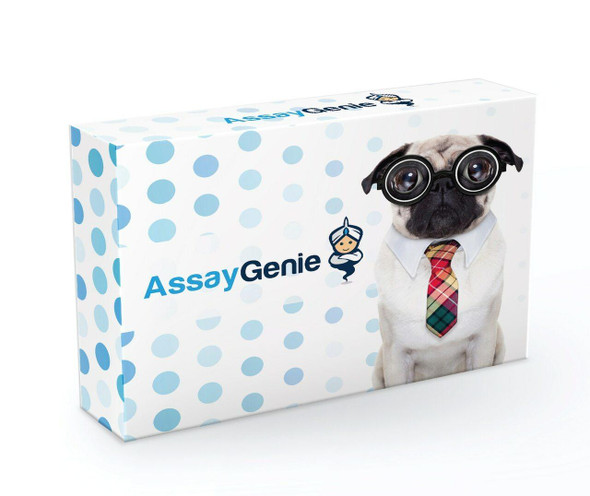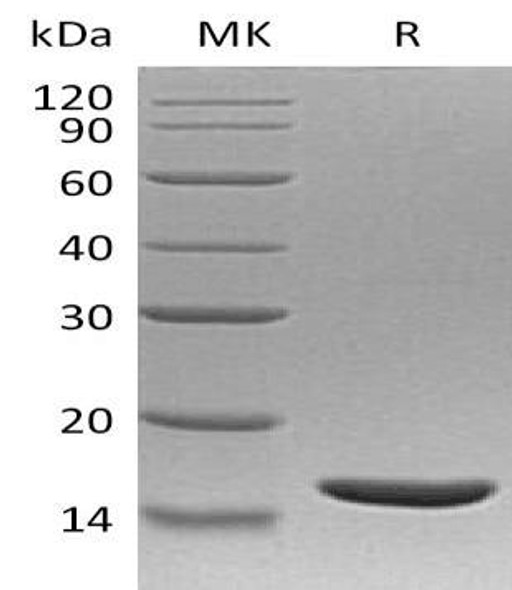Description
| Product Name: | Human TNF b Recombinant Protein |
| Product Code: | RPPB1003 |
| Size: | 20µg |
| Species: | Human |
| Target: | TNF b |
| Synonyms: | Lymphotoxin-alpha, LT-alpha, TNF-beta, Tumor necrosis factor ligand superfamily member 1, LTA, LT, TNFB, TNFSF1. |
| Source: | Escherichia Coli |
| Physical Appearance: | Sterile Filtered White lyophilized (freeze-dried) powder. |
| Formulation: | Lyophilized protein with no additives. |
| Solubility: | It is recommended to reconstitute the lyophilized Tumor Necrosis Factor-beta in sterile 18M?-cm H2O not less than 100�g/ml, which can then be further diluted to other aqueous solutions. |
| Stability: | Lyophilized Tumor Necrosis Factor-b although stable at room temperature for 3 weeks, should be stored desiccated below -18°C. Upon reconstitution TNF-b should be stored at 4°C between 2-7 days and for future use below -18°C.For long term storage it is recommended to add a carrier protein (0.1% HSA or BSA).Please prevent freeze-thaw cycles. |
| Purity: | Greater than 98.0% as determined by:(a) Analysis by RP-HPLC.(b) Analysis by SDS-PAG. |
| Amino Acid Sequence: | MLPGVGLTPS AAQTARQHPK MHLAHSTLKP AAHLIGDPSK QNSLLWRANT DRAFLQDGFS LSNNSLLVPT SGIYFVYSQV VFSGKAYSPK ATSSPLYLAH EVQLFSSQYP FHVPLLSSQK MVYPGLQEPW LHSMYHGAAF QLTQGDQLST HTDGIPHLVL SPSTVFFGAF AL |
| Biological Activity: | The ED50 as determined by the cytolysis of murine L929 cells in the presence of Actinomycin D is < 0.05ng/ml, corresponding to a Specific Activity of 20,000,000IU/mg. |
Lymphotoxin alpha, a member of the tumor necrosis factor family, is a cytokine produced by lymphocytes. LTA is highly inducible, secreted, and exists as homotrimeric molecule. LTA forms heterotrimers with lymphotoxin-beta which anchors lymphotoxin-alpha to the cell surface. LTA mediates a large variety of inflammatory, immunostimulatory, and antiviral responses. LTA is also involved in the formation of secondary lymphoid organs during development and plays a role in apoptosis.
Tumor Necrosis Factor-b Human Recombinant (Lymphotoxin) produced in E.Coli is a single, non-glycosylated, polypeptide chain containing 172 amino acids and having a molecular mass of 18645 Dalton. The TNF-b is purified by standard chromatographic techniques.
| UniProt Protein Function: | LTA: Cytokine that in its homotrimeric form binds to TNFRSF1A/TNFR1, TNFRSF1B/TNFBR and TNFRSF14/HVEM. In its heterotrimeric form with LTB binds to TNFRSF3/LTBR. Lymphotoxin is produced by lymphocytes and cytotoxic for a wide range of tumor cells in vitro and in vivo. Genetic variations in LTA are a cause of susceptibility psoriatic arthritis (PSORAS). PSORAS is an inflammatory, seronegative arthritis associated with psoriasis. It is a heterogeneous disorder ranging from a mild, non-destructive disease to a severe, progressive, erosive arthropathy. Five types of psoriatic arthritis have been defined: asymmetrical oligoarthritis characterized by primary involvement of the small joints of the fingers or toes; asymmetrical arthritis which involves the joints of the extremities; symmetrical polyarthritis characterized by a rheumatoidlike pattern that can involve hands, wrists, ankles, and feet; arthritis mutilans, which is a rare but deforming and destructive condition; arthritis of the sacroiliac joints and spine (psoriatic spondylitis). Belongs to the tumor necrosis factor family. |
| UniProt Protein Details: | Protein type:Cytokine; Apoptosis; Secreted; Secreted, signal peptide Chromosomal Location of Human Ortholog: 6p21.3 Cellular Component: extracellular space; membrane Molecular Function:cytokine activity; tumor necrosis factor receptor binding; receptor binding Biological Process: response to drug; positive regulation of humoral immune response mediated by circulating immunoglobulin; apoptosis; positive regulation of apoptosis; response to lipopolysaccharide; signal transduction; lymph node development; humoral immune response; defense response to Gram-positive bacterium; positive regulation of interferon-gamma production; cell-cell signaling; negative regulation of fibroblast proliferation; response to hypoxia; positive regulation of chronic inflammatory response to antigenic stimulus; response to nutrient Disease: Psoriatic Arthritis, Susceptibility To; Myocardial Infarction, Susceptibility To; Leprosy, Susceptibility To, 4 |
| NCBI Summary: | The encoded protein, a member of the tumor necrosis factor family, is a cytokine produced by lymphocytes. The protein is highly inducible, secreted, and forms heterotrimers with lymphotoxin-beta which anchor lymphotoxin-alpha to the cell surface. This protein also mediates a large variety of inflammatory, immunostimulatory, and antiviral responses, is involved in the formation of secondary lymphoid organs during development and plays a role in apoptosis. Genetic variations in this gene are associated with susceptibility to leprosy type 4, myocardial infarction, non-Hodgkin's lymphoma, and psoriatic arthritis. Alternatively spliced transcript variants have been observed for this gene. [provided by RefSeq, Jul 2012] |
| UniProt Code: | P01374 |
| NCBI GenInfo Identifier: | 135940 |
| NCBI Gene ID: | 4049 |
| NCBI Accession: | P01374.2 |
| UniProt Secondary Accession: | P01374,Q8N4C3, Q9UKS8, |
| UniProt Related Accession: | P01374 |
| Molecular Weight: | 22,297 Da |
| NCBI Full Name: | Lymphotoxin-alpha |
| NCBI Synonym Full Names: | lymphotoxin alpha |
| NCBI Official Symbol: | LTA�� |
| NCBI Official Synonym Symbols: | LT; TNFB; TNFSF1�� |
| NCBI Protein Information: | lymphotoxin-alpha; LT-alpha; TNF-beta; TNF superfamily, member 1; tumor necrosis factor beta; tumor necrosis factor ligand superfamily member 1 |
| UniProt Protein Name: | Lymphotoxin-alpha |
| UniProt Synonym Protein Names: | TNF-beta; Tumor necrosis factor ligand superfamily member 1 |
| Protein Family: | Lymphotoxin |
| UniProt Gene Name: | LTA�� |
| UniProt Entry Name: | TNFB_HUMAN |










